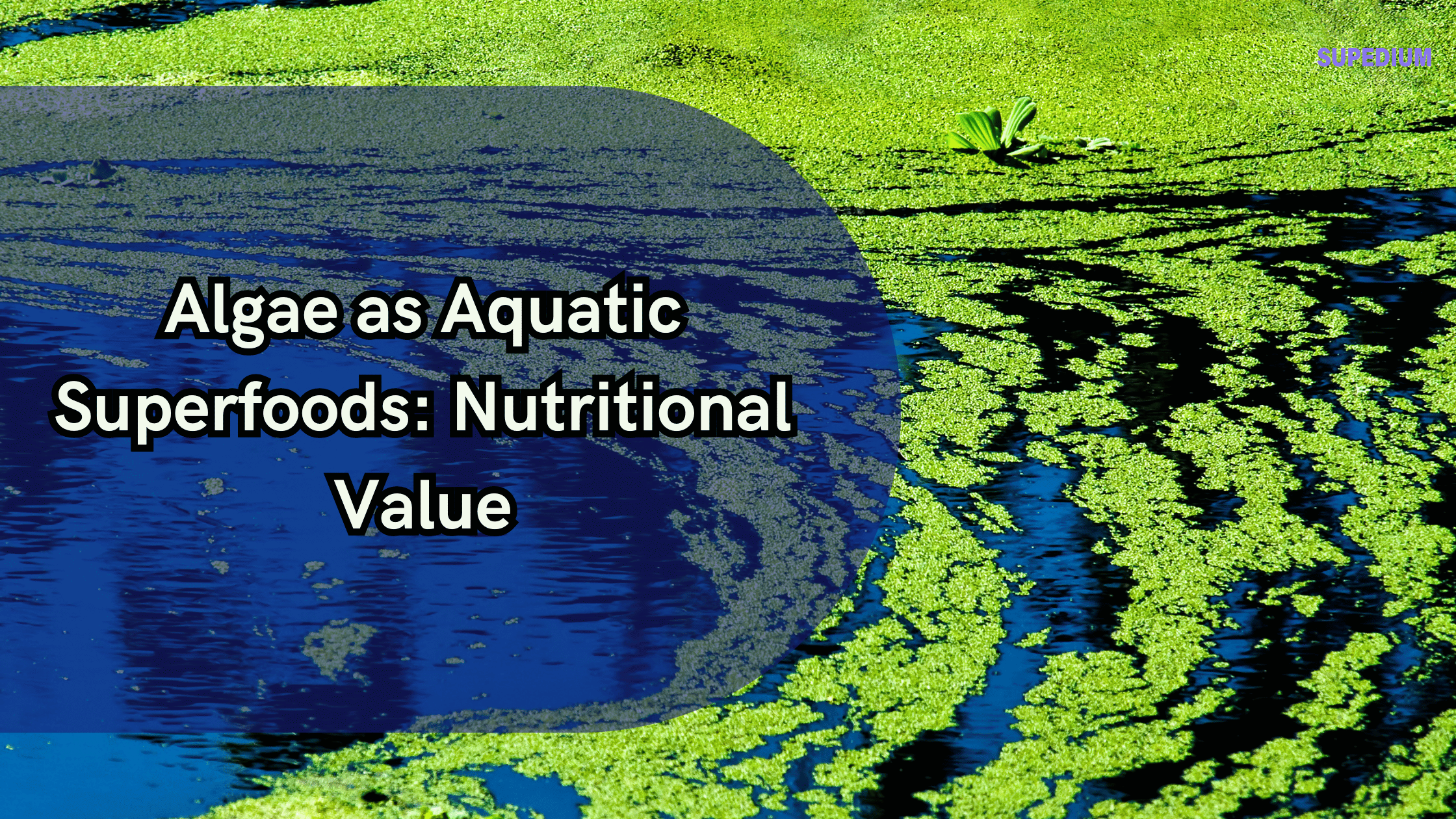Table of Contents
![]()
Algae, often overlooked in the realm of nutrition, are emerging as powerful aquatic superfoods. Their rich nutritional profile and diverse health benefits position them as a compelling addition to diets around the world. This article explores the nutritional value of algae, their health benefits, comparisons with other superfoods, and considerations for consumers.
Introduction
Definition of Algae
Algae are a diverse group of photosynthetic organisms that range from microscopic microalgae to large macroalgae, such as seaweeds. Microalgae, like Spirulina and Chlorella, are single-celled organisms that thrive in both freshwater and marine environments. Macroalgae, including Nori and Kelp, are larger and often found in marine environments. Despite their varied forms, algae are increasingly recognized for their nutritional benefits.
Importance in Aquatic Ecosystems
Algae play a crucial role in aquatic ecosystems, serving as the primary producers in many aquatic environments. They convert sunlight into energy through photosynthesis, providing the foundation for aquatic food chains.
Growing Interest as a Superfood
Historically, algae have been consumed in various cultures, particularly in Asia. In recent years, there has been a surge of interest in algae as a superfood due to their impressive nutrient density and potential health benefits. This modern trend reflects a growing awareness of the need for sustainable and nutrient-rich food sources.
Nutritional Profile of Algae
Macronutrients
- Protein Content Algae are a significant source of protein, with varieties such as Spirulina containing up to 60-70% protein by dry weight. Notably, algae provide complete proteins, meaning they contain all nine essential amino acids required for human health. This makes them a valuable protein source, especially for those following plant-based diets.
- Carbohydrates Algae offer a range of carbohydrates, including polysaccharides and fibers. These carbohydrates contribute to energy levels and aid digestion. For example, the polysaccharides in Chlorella can have beneficial effects on gut health and may support immune function.
- Fats Algae are rich in essential fatty acids, such as Omega-3 and Omega-6. These healthy fats are crucial for cardiovascular health, brain function, and reducing inflammation. Spirulina, for instance, is notable for its high content of Omega-3 fatty acids, which are typically found in fish oils.
Micronutrients
- Vitamins Algae are packed with a variety of vitamins:
- Vitamin A: Algae like Spirulina are high in beta-carotene, a precursor to vitamin A, which is essential for vision and immune function.
- Vitamin B12: Spirulina and Chlorella are among the few plant-based sources of vitamin B12, crucial for red blood cell formation and neurological health.
- Vitamin C: Various algae contain vitamin C, an antioxidant that supports immune function and skin health.
- Vitamin D: Some algae, particularly those used in supplements, are rich in vitamin D, which is vital for bone health and immune function.
- Vitamin K: Algae like Nori contain vitamin K, which is important for blood clotting and bone health.
- Minerals Algae are an excellent source of essential minerals:
- Iron: Spirulina is particularly high in iron, which is important for oxygen transport in the blood.
- Calcium: Algae such as Kelp are rich in calcium, crucial for bone health and muscle function.
- Magnesium: Magnesium is present in various algae and plays a role in over 300 biochemical reactions in the body.
- Iodine: Kelp and other seaweeds are rich in iodine, necessary for thyroid function and hormone regulation.
- Potassium: Algae provide potassium, which helps regulate blood pressure and fluid balance.
- Antioxidants Algae contain powerful antioxidants:
- Phycocyanins: Found in Spirulina, phycocyanins are blue pigments with strong antioxidant and anti-inflammatory properties.
- Chlorophyll: Present in Chlorella, chlorophyll supports detoxification and may enhance overall health.
- Polyphenols: Various algae have polyphenols, which have antioxidant properties that can help reduce oxidative stress.
Health Benefits of Algae
Immune System Support
Algae can enhance immune responses due to their rich nutrient profile, including antioxidants and vitamins. Phycocyanins in Spirulina have been shown to boost immune function and reduce inflammation.
Digestive Health
Algae are beneficial for digestive health. The fibers and polysaccharides in algae act as prebiotics, promoting the growth of beneficial gut bacteria and supporting overall gut health.
Cardiovascular Health
The omega-3 fatty acids in algae can improve cardiovascular health by reducing cholesterol levels and regulating blood pressure. Studies suggest that regular consumption of algae may lower the risk of heart disease.
Cognitive Function
Algae like Spirulina have neuroprotective properties that may enhance cognitive function and mental clarity. Omega-3 fatty acids and antioxidants play a role in maintaining brain health and potentially reducing the risk of neurodegenerative diseases.
Detoxification
Algae support detoxification by binding to heavy metals and toxins, aiding in their removal from the body. Chlorella, in particular, is known for its ability to help detoxify the liver.
Weight Management
Algae may assist with weight management by promoting satiety and regulating appetite. The fiber content in algae can help you feel full longer, which may aid in weight control.
Comparison with Other Superfoods
Algae vs. Spirulina and Chlorella
Both Spirulina and Chlorella are types of microalgae with unique nutritional profiles. Spirulina is renowned for its high protein content and antioxidant properties, while Chlorella is notable for its detoxification abilities and high vitamin B12 content.
Algae vs. Land-Based Superfoods
Compared to land-based superfoods like kale or quinoa, algae offer a more concentrated nutrient profile. For instance, while kale is high in vitamins A and K, algae provide a broader spectrum of nutrients, including omega-3 fatty acids and vitamin B12, which are less common in plant-based sources.
Environmental Impact and Sustainability
Algae Cultivation
Algae cultivation is highly efficient, requiring fewer resources than traditional agriculture. Algae grow rapidly in various environments, including open ponds and closed systems, and require less water and land compared to land-based crops.
Carbon Footprint and Ecological Benefits
Algae cultivation contributes to carbon sequestration, helping to mitigate climate change. Additionally, algae can reduce ocean acidification by absorbing carbon dioxide, which benefits marine ecosystems.
Challenges and Considerations
Potential Allergies and Sensitivities
Some individuals may experience allergies or sensitivities to specific types of algae. It is essential to introduce algae into the diet gradually and consult a healthcare professional if any adverse reactions occur.
Quality and Purity Issues
Quality control is crucial when selecting algae products. Contaminants such as heavy metals and toxins can be present, so choosing certified and reputable sources is vital for safety.
Cost and Accessibility
The cost of algae products can be higher compared to other superfoods, and availability may vary. However, as demand increases and production methods improve, costs are expected to become more competitive.
Conclusion
Algae represent a promising group of aquatic superfoods with an impressive nutritional profile and a range of health benefits. Their rich content of proteins, essential fatty acids, vitamins, and minerals makes them a valuable addition to a balanced diet. With their sustainable cultivation practices and potential to address global food security challenges, algae are poised to play a significant role in the future of nutrition. As research continues to uncover their full potential, algae will likely become an increasingly prominent component of healthy eating strategies.
Share This





Be the first to comment